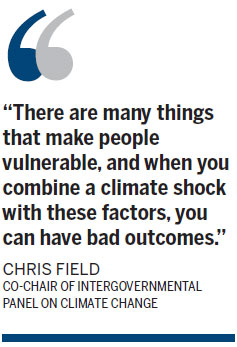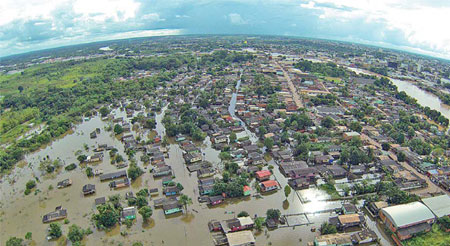Climate change increases conflict risk, floods, hunger
Greenhouse gas emissions could cause trillions of dollars in damage: UN panel
Soaring carbon emissions will amplify the risk of conflict, hunger, floods and mass migration this century, the UN's expert panel said on Monday in a landmark report on the impact of climate change.
Left unchecked, greenhouse gas emissions may cost trillions of dollars in damage to property and ecosystems, and in bills for shoring up climate defenses, it said, adding the impact would increase with every additional degree that temperatures rise.
"Increasing magnitudes of warming increase the likelihood of severe, pervasive and irreversible impacts," a summary said, in a stark message to policymakers.
The report is the second chapter of the fifth assessment by the Intergovernmental Panel on Climate Change, set up in 1988 to provide neutral, science-based guidance to governments.
The last overview, published in 2007, unleashed a wave of political action that at one point appeared set to forge a worldwide treaty on climate change in Copenhagen in 2009.

In the United States, President Barack Obama's attempts at passing climate change legislation have been stymied in Congress, where many Republicans remain unconvinced of the scientific case for warming and argue that mitigation efforts are an unnecessary block on economic growth.
The new document, unveiled in Yokohama after a five-day meeting, gives the starkest warning yet by the IPCC of extreme consequences from climate change, and delves into greater detail than ever before into the impact at regional level.
It builds on previous IPCC forecasts that global temperatures will rise 0.3-4.8 C this century, on top of roughly 0.7 C since the Industrial Revolution.
Seas are forecast to rise by 26-82 centimeters by 2100.
Security risk
Warming of around 2 C over pre-industrial times may cost 0.2-2 percent of global annual income, said the new report. UN members have pledged to hammer out a global pact by the end of 2015 to limit warming to 2 C above pre-industrial levels.
Even though heat and carbon dioxide are often considered good for plants, the overall effect of various aspects of man-made warming is that it will reduce food production compared to a world without global warming, the report said.
The impact amplifies with every degree and beyond 4 C could be disastrous, the report said.
Climate change could drive turbulence and conflict, prompted by migration from newly uninhabitable areas and jockeying for water and food, it said.
"Climate change has a tendency to act as a threat multiplier whatever the current range of stressors is," said Chris Field, co-chair of the conference.
"There are many things that make people vulnerable, and when you combine a climate shock with these factors, you can have bad outcomes.
"With high levels of warming that result from continued growth in greenhouse gas emissions, risks will be challenging to manage, and even serious, sustained investments in adaptation will face limits."
Rainfall patterns will be disrupted, resulting in a significantly higher flood risk, especially for Europe and Asia - and magnified drought risks will add to water stress in arid, heavily populated areas, the report said.
This, in turn, will have consequences for agriculture. Yields of staples such as wheat, rice and corn will be squeezed, just as demand will soar because of population growth, it predicts.
Even though heat and carbon dioxide are often considered good for plants, the overall effect of various aspects of man-made warming is that it will reduce food production compared to a world without global warming, the report said.
It said climate change will also have a ricochet effect on health, through the spread of mosquito- or water-borne diseases and heatwaves.
Vulnerable plant and animal species, especially in fragile coral reefs and Arctic habitats, could be wiped out.
Adding a further grim layer to the warning, the report said the most vulnerable ecosystems faced a potential "tipping point" that could pitch them into unstoppable decline.
AFP-AP
|
An aerial picture shows a neighborhood flooded by the Acre River in the region including northern Bolivia and eastern Peru. UN Intergovernmental Panel on Climate Change scientists on Monday released a report that urges swift action to counter the effects of carbon emissions. Odair Leal / Reuters |
(China Daily 04/01/2014 page10)















